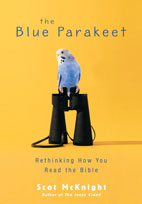
Scot McKnight’s new book, The Blue Parakeet: Rethinking How You Read the Bible, maps out a method of reading the Bible that recognizes both its authority as inspired Scripture and our contemporary context. McKnight observes that we all “pick and choose” the passages of Scripture that we focus on. The keys, he argues, are reading the Bible within its overall Story (picked up from McKnight’s earlier book, Embracing Grace
), listening to the person of God speak through the Bible, and trusting both the Spirit and the Great Tradition of the church to help us discern the proper interpretation and application of specific passages. McKnight helpfully distinguishes between reading the Bible through Tradition (which fossilizes the interpretations of the past and elevates the Tradition to authority over Scripture) and reading with Tradition (which honors and listens to the Tradition, but also challenges it when appropriate).
The goal:
…as we read the Bible and locate each item in its place in the Story, as we listen to God speak to us in our world through God’s ancient Word, we discern-through God’s Spirit and in the context of our community of faith-a pattern of how to live in our world [italics and emphasis original] (129)
The final section of the book is devoted to applying this method to the question of the role of women in the church, with particular interest to 1 Corinthians 14:34-25 and 1 Timothy 2:11-15, passages which command women to be silent in the church. In keeping with his method of reading the Bible as a Story, McKnight looks not just at what commands are given to women in Scripture, but also examines what women actually do in the Bible-women in the OT like Miriam, Deborah, and Huldah, and women in the NT like Mary, Phoebe, Priscilla, and Junia-as well the cultural context of Paul’s letters. If you’re familiar with McKnight’s work, you won’t be surprised that he concludes that the overall Story of the Bible points to “an increasing expansion of women in church ministries” (204).
Overall, Blue Parakeet is well-written and convincing, written for an audience that takes the Bible seriously but doesn’t have an academic background in Biblical studies. This book will help greatly anyone who is disenchanted with legalistic or rationalistic ways of reading the Bible, and wants a fresh way of listening to Scripture’s authority. Those who are suspicious of McKnight’s methods, however, will likely find themselves frustrated, as most of his footnotes refer readers to other books, rather than providing a scholarly foundation for his conclusions within the current book.
The former Associate Director for the Emerging Scholars Network, Micheal lives in Cincinnati with his wife and three children and works as a web manager for a national storage and organization company. He writes about work, vocation, and finding meaning in what you do at No Small Actors.

Leave a Reply